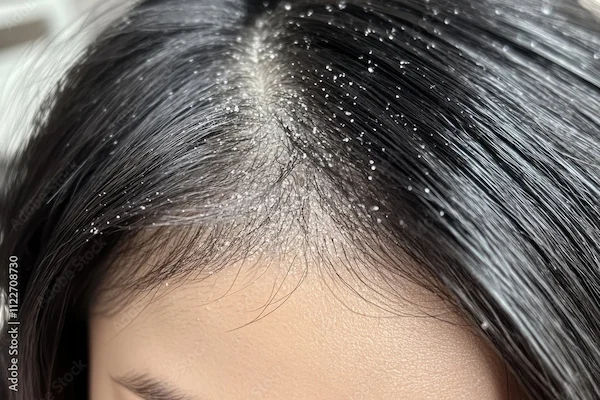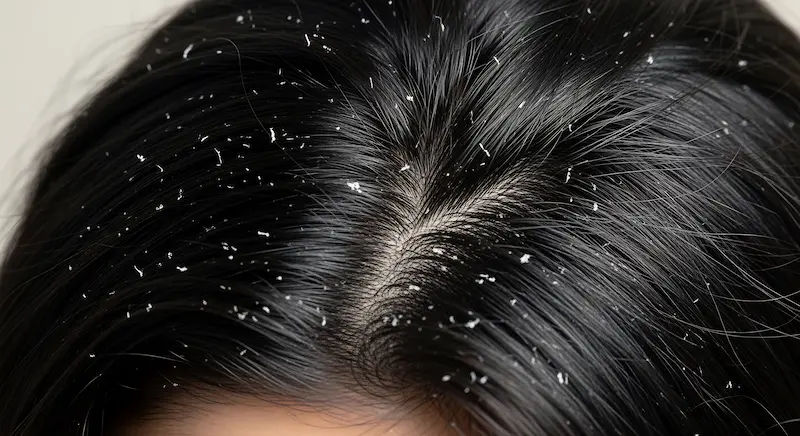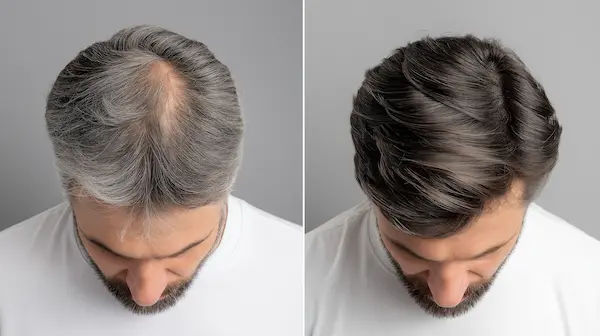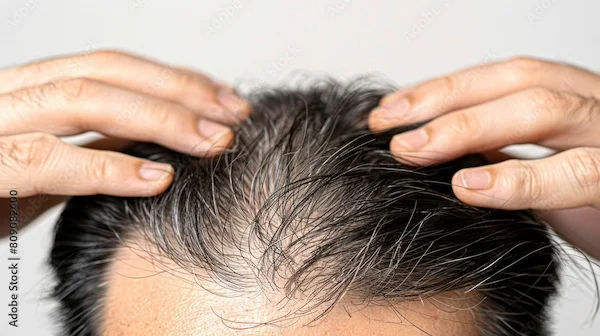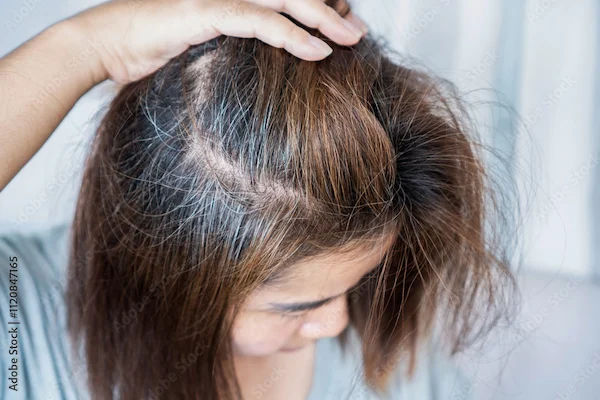Dandruff Removal Methods: A Comprehensive Guide to a Healthier Scalp
Learn about some practical ways to remove dandruff. Discover the causes, symptoms, diet changes, stress management and treatments for dandruff.

Written by
Last updated on 13th Jan, 2026
Dandruff is a common scalp condition characterised by white or yellow flakes of dead skin, often accompanied by itchiness. It occurs when the scalp sheds skin cells more quickly than usual, leading to visible flakes. While dandruff is not contagious or serious, it can be embarrassing and uncomfortable. Common causes include dry skin, oily skin, fungal infections, and sensitivity to hair care products. Ignoring dandruff can lead to persistent itchiness, scalp irritation, and even hair loss in severe cases. Addressing dandruff not only improves scalp health but also boosts confidence and overall well-being. With the right approach, dandruff can be effectively managed and prevented.
Common Causes of Dandruff
While there can be different causes of dandruff, the most common ones include:
1. Dry Skin and Seborrheic Dermatitis
Dry skin is one of the most common causes of dandruff, especially during colder months. Seborrheic dermatitis, a more severe form of dandruff, is caused by an overproduction of oil (sebum) on the scalp, leading to red, greasy skin covered with flaky white or yellow scales.
2. Fungal Infections and Sensitivity to Hair Care Products
A yeast-like fungus called Malassezia naturally lives on the scalp but can overgrow in some people, causing dandruff. Additionally, sensitivity to certain hair care products, such as shampoos or styling gels, can trigger scalp irritation and flaking.
Symptoms of Dandruff
Common symptoms of dandruff include:
- Presence of white or yellow flakes on the scalp, hair, and shoulders
- Itchiness, which can range from mild to severe
Dandruff is often confused with conditions like psoriasis or eczema. Psoriasis causes thicker, silvery scales, while eczema leads to red, inflamed skin. If you’re unsure, consult a dermatologist for an accurate diagnosis.
Treatment of Dandruff
Here are the different ways through which dandruff can be treated:
1. Over-the-Counter Treatments
Anti-dandruff shampoos are the first line of defence. Look for active ingredients like:
- Zinc pyrithione: Reduces fungus and bacteria.
- Ketoconazole: An antifungal agent.
- Salicylic acid: Exfoliates the scalp to remove flakes.
- Selenium sulfide: Slows skin cell turnover and reduces fungus.
- Coal tar: Slows skin cell growth and reduces flaking.
For best results, use anti-dandruff shampoos 2-3 times a week. Massage the shampoo into your scalp and leave it on for 5-10 minutes before rinsing. If one product doesn’t work, try another with a different active ingredient.
2. Prescription Treatments
If over-the-counter treatments fail or your symptoms worsen, consult a dermatologist. Persistent dandruff could indicate an underlying condition like seborrheic dermatitis or psoriasis.
Dermatologists may prescribe stronger antifungal shampoos, corticosteroid lotions, or oral medications like fluconazole. These treatments target the root cause of severe dandruff and provide long-lasting relief.
3. Natural Remedies for Dandruff
Some natural remedies can help manage dandruff:
- Tea tree oil: Has antifungal and antibacterial properties. Mix a few drops with a carrier oil and massage into the scalp.
- Aloe vera: Soothes the scalp and reduces flaking.
- Apple cider vinegar: Balances the scalp’s pH and reduces fungus. Dilute with water and rinse your hair after shampooing.
While natural remedies can be effective, they may not work for everyone. For example, tea tree oil can irritate those with sensitive skin. Always patch-test before use and discontinue if any adverse reactions occur.
4. Lifestyle and Diet changes
Changes that may help treat dandruff include:
- A balanced diet rich in vitamins and minerals can improve scalp health. Foods high in zinc (e.g., nuts, and seeds), omega-3 fatty acids (e.g., fatty fish), and B vitamins (e.g., whole grains) may help reduce dandruff.
- Avoid excessive sugar and processed foods, which can exacerbate fungal growth.
- Stress can weaken the immune system, making the scalp more susceptible to dandruff.
- Practice stress-relief techniques like yoga, meditation, or regular exercise to maintain a healthy scalp.
Consult Top Dermatologist
Preventive Measures to Avoid Dandruff
Easy ways to prevent dandruff may include:
- Washing your hair regularly with a gentle shampoo helps remove excess oil, dirt, and flakes.
- Avoid using hot water, as it can dry out the scalp and worsen dandruff.
- Hair products like gels, sprays, and serums can build up on the scalp, leading to irritation and flaking.
- Use clarifying shampoos occasionally to remove residue and keep your scalp clean.
Myths and Misconceptions
Common Misbeliefs and Reality related to dandruff include:
- Myth: Dandruff is caused by poor hygiene.
- Reality: While hygiene plays a role, dandruff is primarily caused by factors like dry skin, fungal overgrowth, or sensitivity to products.
- Myth: Dandruff leads to hair loss.
- Reality: Dandruff itself doesn’t cause hair loss, but excessive scratching can damage hair follicles.
Conclusion
From over-the-counter shampoos to natural remedies and lifestyle changes, there are numerous ways to manage dandruff. The key is to identify the underlying cause and choose the right treatment for your scalp type. Dandruff is a common but manageable condition. With consistent care and the right approach, you can achieve a healthy, flake-free scalp. If symptoms persist, don’t hesitate to seek professional help.
Consult Top Dermatologist
Consult Top Dermatologist
Dr. Mayuri Jain
Dermatologist
11 Years • MBBS, MD Dermatology , Venereology & Leprosy
Delhi
Dr Mayuri Jain Clinic, Delhi
Dr. Kavitha Killaparthy
Dermatologist
23 Years • MBBS,DIPLOMA(DERMATOLOGY,VENEREOLOGY,LEPROSY)
Hyderabad
JDS Skin & Hair Clinic, Hyderabad

Dr Ekansh Shekhar
Dermatologist
10 Years • MBBS MD
Lucknow
Apollo Clinic Hazratganj, Lucknow
Dr.j Girishma
Dermatologist
6 Years • MBBS MD DERMATOLOGY
Bengaluru
Apollo Medical Center, Marathahalli, Bengaluru
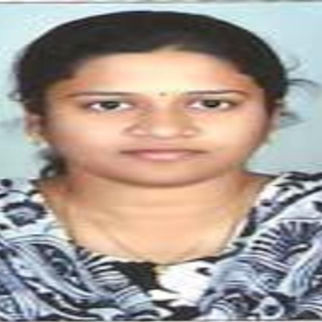
Dr. Swathi Thadishetti
Dermatologist
14 Years • MBBS, MD (Dermatology, Venereology & Leprosy)
Karim Nagar
RKD Hospital, Karim Nagar
Consult Top Dermatologist
Dr. Mayuri Jain
Dermatologist
11 Years • MBBS, MD Dermatology , Venereology & Leprosy
Delhi
Dr Mayuri Jain Clinic, Delhi
Dr. Kavitha Killaparthy
Dermatologist
23 Years • MBBS,DIPLOMA(DERMATOLOGY,VENEREOLOGY,LEPROSY)
Hyderabad
JDS Skin & Hair Clinic, Hyderabad

Dr Ekansh Shekhar
Dermatologist
10 Years • MBBS MD
Lucknow
Apollo Clinic Hazratganj, Lucknow
Dr.j Girishma
Dermatologist
6 Years • MBBS MD DERMATOLOGY
Bengaluru
Apollo Medical Center, Marathahalli, Bengaluru

Dr. Swathi Thadishetti
Dermatologist
14 Years • MBBS, MD (Dermatology, Venereology & Leprosy)
Karim Nagar
RKD Hospital, Karim Nagar
